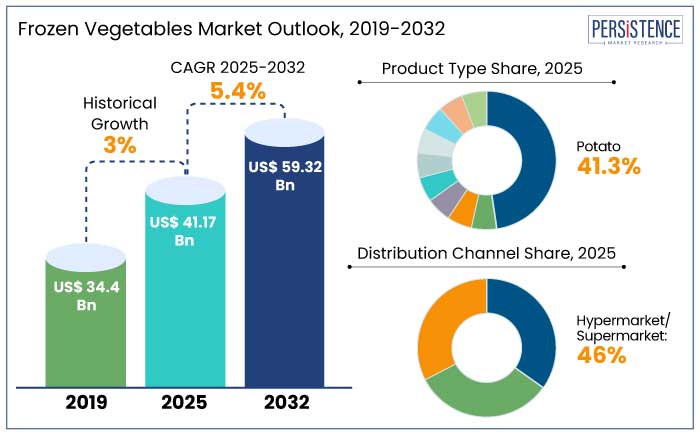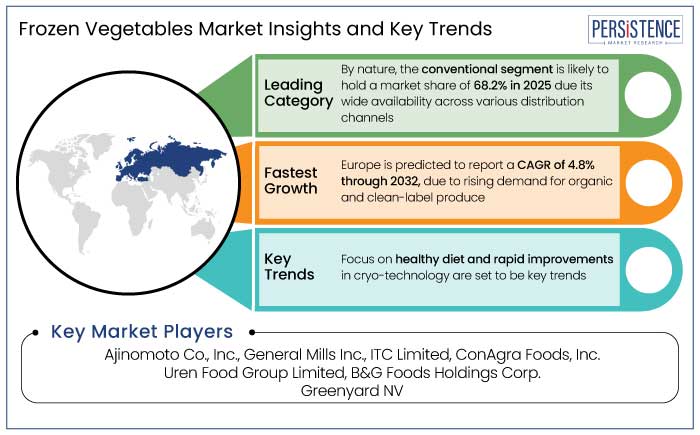Industry: Food and Beverages
Published Date: January-2025
Format: PPT*, PDF, EXCEL
Delivery Timelines: Contact Sales
Number of Pages: 196
Report ID: PMRREP25606
The global frozen vegetables market is estimated to reach a size of US$ 41.17 Bn in 2025. It is predicted to rise at a CAGR of 5.4% through the assessment period to attain a value of US$ 59.32 Bn by 2032.
The demand for convenience products like frozen veggies is rising owing to urbanization in emerging nations like China and India. This is because younger people prefer ready-to-eat, healthy foods that fit into their hectic schedules.
The global pandemic accelerated the trend of frozen food as consumers prioritized products that reduced shopping frequency while retaining nutritional value. For example,

Key Highlights of the Market
|
Market Attributes |
Key Insights |
|
Frozen Vegetables Market Size (2025E) |
US$ 41.17 Bn |
|
Projected Market Value (2032F) |
US$ 59.32 Bn |
|
Global Market Growth Rate (CAGR 2025 to 2032) |
5.4% |
|
Historical Market Growth Rate (CAGR 2019 to 2023) |
3% |
North America is set to account for 28.7% of the global market share in 2025. The region is projected to witness a CAGR of 5.2% through 2032, driven by the trend of home cooking and meal preparation. Consumers increasingly prioritize convenience and health, making frozen vegetables a popular choice for nutritious, ready-to-use meal components.
Based on the studies, the rise of e-commerce platforms and subscription meal services has increased accessibility, with online grocery sales in North America surging by 15% in 2023. For instance,
Europe is projected to hold 34.5% of the global market share in 2025, with a forecast CAGR of 4.8% from 2025 to 2032. It is set to be driven by rising demand for convenient, healthy meal solutions and changing lifestyles.
Consumers in Europe are adopting vegan and plant-based diets, prioritizing organic and locally sourced frozen vegetables for their nutritional benefits and environmental sustainability. Germany is attracting suppliers from emerging countries to meet the high demand for organic produce. For instance,
In 2025, potatoes are set to dominate the frozen vegetables market, accounting for 41.3% of the total share. It is set to be driven by their versatility, availability, and significant demand from the foodservice sector. For example,
Frozen potatoes are leading the market due to their widespread adoption in restaurants and rising consumer demand for convenience and quick meal solutions.
In 2025, conventional frozen vegetables are anticipated to lead with 68.2% of the global market share. It is due to their affordability and wide availability, particularly among budget-conscious consumers.
Conventional frozen vegetables remain popular due to cost-effectiveness and extensive distribution networks, with sales rising by 9% in 2023. It will likely be supported by strong demand in retail and food service sectors, despite the rise in organic options. For example,
In light of the increased interest in organic alternatives, the study emphasizes how important cost and convenience are to preserving the appeal of traditional frozen veggies.
The consumer base for frozen greens is surging due to rising customer demand for quick and healthy meal alternatives. Increasing urban population, shifting food habits, and improvements in freezing technology are set to contribute to the industry.
Consumption is increased by the immense popularity of vegetarian and plant-based diets. Accessibility is improved by the growth of organized retail and e-commerce platforms. The need for bulk frozen vegetables is fueled by the booming foodservice sector. For example,
The advantages of cutting-edge freezing technology is improving the texture and flavor of vegetables. It is highlighted by the fact that 60% of working professionals choose frozen vegetables for speedy meal preparation.
Leading brands are attracting 70% vegetarian and vegan consumers with their specialized plant-based frozen vegetable offerings, highlighting opportunities in the plant-based market and e-commerce growth. Sales of refrigerated vegetables are rising quickly, with hypermarkets and supermarkets leading the way with a total share of 46% in 2025.

The global frozen vegetables market recorded a CAGR of 3% in the historical period from 2019 to 2023. Demand for frozen meals is rising in Asia Pacific, which includes countries like India and Japan. Under the Farmland brand, companies such as ITC Limited have increased the range of products they provide by adding frozen veggies and prawns.
In 2020, Ajinomoto Co., Inc. introduced AJISWEET RA, a stevia sweetener, to solve flavor problems that food and beverage producers in Japan were experiencing. Conagra labels introduced more than 12 items under several labels in response to shifting consumer demands.
To increase their market presence, the businesses are taking advantage of shifting lifestyles and economies. Demand for products featuring frozen vegetables is estimated to record a considerable CAGR of 5.4% during the forecast period between 2025 and 2032.
Rising Demand for Long Shelf Life to Spur Sales
Since frozen vegetables have a long shelf life and high nutritional content, the market is booming quickly due to dietary choices and nutritional awareness.
Improvements in technology for freezing processes promote market growth by maintaining quality retention and appealing to plant-based dietary choices for nutritious, convenient meal alternatives.
High Popularity of Ready-to-eat Products to Influence Demand
As working hours in cities have increased, so has consumer demand for processed meals, resulting in the emergence of frozen veggies. Frozen produce makes them more accessible to customers by providing a fast and wholesome substitute for boxed meals.
Customers' need for good, quick, and reasonably priced meal alternatives because of their hectic schedules has led to a huge increase in the frozen fruits and vegetables industry. It has, in turn, caused firms to concentrate on creating new products. For instance,
High Operational Costs May Hinder Supply Chain of Frozen Foods
The availability of raw materials is projected to fluctuate, resulting in supply constraints and product quality fluctuations that will impair production and operations. Frozen veggies require specialized storage facilities, which raises operating costs and inhibits market growth. For instance,
Market stability has been impacted by supply chain disruptions that have raised production costs and produced vegetables of uneven quality. Consumer purchasing decisions are being influenced by concerns about sustainability, energy consumption, and packaging materials, which is pushing frozen vegetable producers to adopt eco-friendly practices and lessen their environmental effects.
Innovation in Freezing Technologies Present Growth Prospects
Innovation in freezing technologies is altering the frozen meal market by ensuring better preservation of nutritional content and improved product quality. Global investments in freezing technologies such as individual quick freezing (IQF) and cryogenic freezing, driven by consumer preferences for premium frozen foods, increased by 8% in 2023, focusing on methods like individual quick freezing and cryogenic freezing. For instance,
The quality and nutritional value of frozen meals are improved by technological developments, increasing their appeal as quick and healthful dinner alternatives.
Popularity of Plant-based and Vegetarian Diets Presents Sustainable Avenues
Global consumption of refrigerated veggies is rising dramatically due to the popularity of plant-based and vegetarian diets, which offer a sustainable and practical substitute for conventional food alternatives. For instance,
Frozen vegetables are gaining popularity as a part of plant-based diets due to the growing emphasis on reducing meat consumption and promoting environmental sustainability.
Key manufacturers control the frozen vegetables market, and innovation and quality are important considerations. To stay ahead of the competition, leading manufacturers take advantage of their extensive product lines and distribution systems.
In order to accommodate different consumer preferences and culinary customs, vendors make use of their special skills and market knowledge. Partnership agreements and market penetration improve the competitive landscape.
Prominent suppliers, such as those listed above, promote market dynamism using inventive goods and flexible supply networks. The competitive environment is anticipated to change toward growth and diversification as consumer preferences change and the need for quick, healthful food alternatives rises, although competition is already fierce.
Recent Industry Developments
|
Attributes |
Details |
|
Forecast Period |
2025 to 2032 |
|
Historical Data Available for |
2019 to 2023 |
|
Market Analysis |
US$ Billion for Value |
|
Key Regions Covered |
|
|
Key Market Segments Covered |
|
|
Key Companies Profiled in the Report |
|
|
Report Coverage |
|
|
Customization and Pricing |
Available upon request |
By Nature
By Product Type
By Distribution Channel
By Region
To know more about delivery timeline for this report Contact Sales

The market size is set to reach US$ 59.32 Bn by 2032.
Rising frozen vegetable prices are primarily due to factors such as immigration trends, labor as well as fertilizer costs, and the war effects in Ukraine.
In 2025, North America is set to attain a market share of 28.7%.
In 2025, the market is estimated to be valued at US$ 41.17 Bn.
Ajinomoto Co., Inc., General Mills Inc., ITC Limited, and ConAgra Foods, Inc. are a few key players.